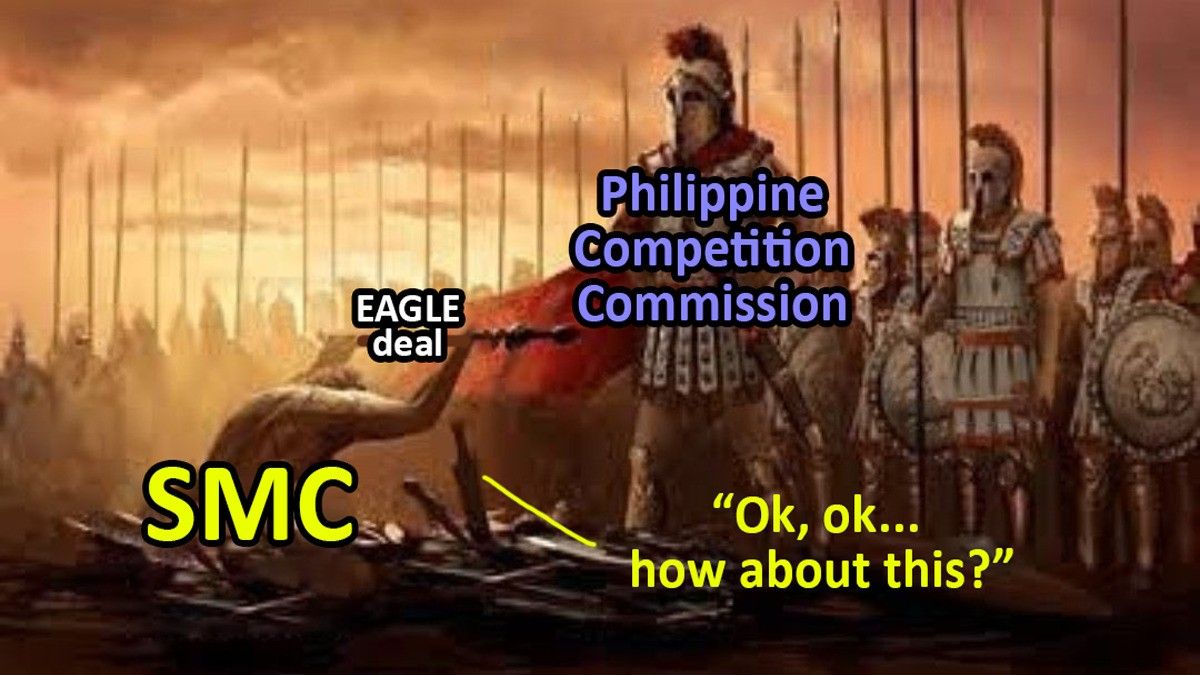Eagle Cement up 21% on SMC buyout and tender offer

Eagle Cement [EAGLE 18.56 20.52%], owned by Ramon Ang, surged to an intraday high of P19.70/share on news that San Miguel [SMC 99.00 2.43%], owned by Ramon Ang, had approved the purchase of 88.5% of EAGLE’s outstanding shares at a price of P22.02/share. The change in control of EAGLE, from one entity owned by Mr. Ang to another owned by Mr. Ang, would require SMC to conduct a tender offer for the remaining shares in the public float. The tender offer price would be at the same price that SMC paid for the EAGLE shares. Investor enthusiasm for EAGLE wilted slightly as the day progressed.
Why did the price spike so high? Some investors are buying EAGLE for the chance to sell the shares back to SMC at P22.02/share.
Why didn’t the price end up at P22.02/share? It’s not an absolute certainty that the tender offer will happen, and there are a number of factors that could make someone think twice. How will the Philippine Competition Commission (PCC) react? Will they block the acquisition, just as they did when SMC tried to buy Holcim [HLCM 4.20 10.53%] back in 2020? Even if the regulatory hurdles are overcome, SMC hasn’t provided a timeline for the transaction, or more specifically, a timeline for when the tender offer will occur. HLCM went from P9.50/share in March up to P15.30/share the day the acquisition was announced. Almost exactly one year later, after the PCC rejected the acquisition and SMC officially withdrew its acquisition bid, HLCM’s stock price was back down to P7.77/share. While there can be great rewards in playing this tender offer game, the risks are real!
How likely is it the deal will complete? It’s hard to tell, but if we take EAGLE’s price before the announcement, P15.40/share, and measure how close to the tender offer price of P22.02/share the market price got, we can kind of get a rough idea of the probability of the deal going through. Theoretically, if the market thought there would be zero chance the deal would happen, EAGLE’s price wouldn’t move at all, and if the market was absolutely certain that it would go through, the price would rise to P22.02/share. That the price “only” reached P18.56/share implies a 48% chance of deal completion.
What about the PCC? This one is interesting to me, since back when the PCC blocked SMC’s acquisition of HLCM, it did so in partial reliance on the understanding that the Luzon market for cement considered SMC’s subsidiary, First Stronghold Cement, and EAGLE to be “sister companies” with like control, such that EAGLE was not an effective, arms-reach competitor to First Stronghold. SMC argued, at that time, that EAGLE was an entirely separate company with its own management, and that it was independent of SMC’s leadership. That line of argument would have given SMC the best chance to acquire HLCM back in the day, but will it work against SMC now in its attempt to acquire EAGLE? If SMC and EAGLE are separate and independent, then SMC’s acquisition of EAGLE may have a material impact on consumers of cement in the region.
MB BOTTOM-LINE
The implied chance of success isn’t some crystal ball of prediction; as time passes and we learn new bits of information, the market will consume those bits, people will buy and sell, and EAGLE’s price will change.
That will cause the implied chance of success to change.
Regardless of EAGLE’s exact price, there’s clearly some hesitancy on the part of investors to jump in with two feet as though it’s a done deal with no risk.
SMC has made the PCC review sound like something that is merely administrative, triggered only by the size of the deal itself, but I’m not so sure that’s how investors are looking at it just yet.
The PCC took a very detailed look at the cement market, and I have no reason to think that they’d approach this deal any differently.
They’re a group that can’t be rushed, and that isn’t vulnerable to lazy, convenient thinking.
--

Merkado Barkada's opinions are provided for informational purposes only, and should not be considered a recommendation to buy or sell any particular stock. These daily articles are not updated with new information, so each investor must do his or her own due diligence before trading, as the facts and figures in each particular article may have changed.
- Latest



























